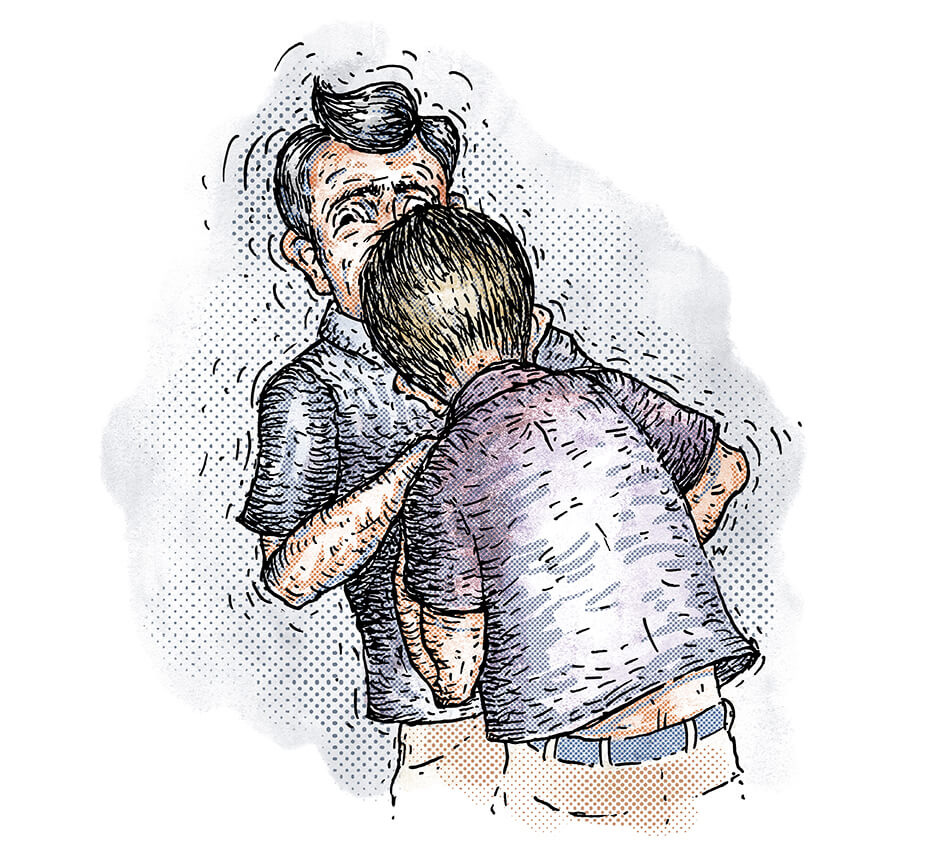The Bully
I ran at him. This time I grabbed his shoulder, throwing him into the corner.
I grew up around other boys. I was surrounded by them. But the boys I most remember were the ones at my school.
We ran in a swirling pack. Bruised egos pushed some of us closer together at times. Alliances were loosely formed and destroyed. We clung together and repelled one another like magnets.
But there was a leader. His name was Arthur. He was brash and tougher than the rest of us. We all wanted to be his best friend and shielded from his spite, but no one was. Truthfully, we all got along well without him.
I remember a week or two each school year when I was the focus of Arthur’s contempt. I don’t know why. Some careless word or embarrassing joke was all it would take to receive a withering glance that preceded a taunt or shove.
One day around noon, we dismissed for lunch period. Most of us went into the boy’s restroom to wash our hands before we ate. Stalls were bolted to one side of the narrow room, and tall urinals lined the facing wall. The concrete floors and steel partitions were painted gloss battleship gray. The walls were dingy white. A large window with frosted glass preserving our modesty let in light and bathed the restroom in a diffused haze.
Often, the boys rushed through the restroom door in a loose current. This day as I went in with the rest of the rushing pack, I lunged forward from a rough shove to my back, making my head snap. My fall forward was arrested by another boy directly in front of me.
Hot fumes of anger rose to my face. I spun around in the crowded, narrow space. I was eye-to-eye with Arthur. He stared at me, full of about as much hatred as any 13-year-old could muster. I choked. He was stronger and meaner, so I only spit out a stubborn, “Stop it.”
He smirked and walked by me, dipping his shoulder into mine as he passed. The other boys watched quietly. I turned, saying more loudly, “I said, stop it.”
Though I blocked one with my forearm, the second struck and pushed a growling gasp out of me.
He turned toward me, looked at the others standing tense with expectation, took a step forward, and said, “No.”
He took another step and thrust his hands into my chest. I stumbled backward.
Hot with rage, I took back my steps and shoved him hard against the sink. He caught himself, then lashed out, closing the distance between us, grabbed my shoulder, and threw two uppercuts into my stomach.
Though I blocked one with my forearm, the second struck and pushed a growling gasp out of me. The pain drained me of fear.
Searing rage displaced the thought of consequences. The restroom became a tunnel as my peripheral vision darkened. The other boys dissolved. I tasted the bitter animosity of never knowing when I would be the target of my friend.
I ran at him. This time I grabbed his shoulder, throwing him into the corner. I threw my uppercuts in a mad succession. With each punch, my confidence grew. I watched him struggle to defend the barrage. He was flailing to block each strike. There was a confusion on his face that I had never seen before. With my anger nearly spent, I stopped, stepping back expecting to see him slide to his knees with his back scraping the dingy wall. I was panting as I stood there.
His head was low, and he slumped in the corner. But instead of crumbling as I had supposed, he raised his head, eyes gleaming in the noon light that quietly beamed through the frosted panes and charged at me.
He caught me by the waist, and as I pounded his back, he spun me around and threw me to the painted concrete floor.
My feet slipped as I struggled to lift myself. I made it to one elbow. Arthur kicked me in the stomach, stepped on my chest with one foot, and quickly added the other. I grabbed his ankles, but his weight paralyzed me.
“Tell me you’re sorry,” he said.
I kept struggling, unwilling to give in.
“Get off of me, “ I wheezed.
“No. Say it,” he repeated.
I was gasping for breath, unable to roll to the left or right. My chest muscles were rigid, and my back was arched, holding the weight. As my air escaped with slow exhales, my pain and panic increased.
“Say it,” he said again.
My anger acquiesced, and I said it. “Sorry,” escaped me in a breathless failure.
Arthur stepped off my chest and walked through the creaking bathroom door.
I sat up and rested my forearms on my knees. A few of the other boys helped me up. I was red with the exertion of the fight. All the other boys hovering nearby soberly washed their hands or tucked in their shirts. We shuffled out of the restroom and slowly walked down the hall and back to class.
The rest of the day wore on with a schoolboy’s monotony. It seemed like all our collective energy was spent.
My solitude was bruised by the noise of dismissal and children in the lower grades moving down the hall in a straggling line to the afternoon bus.
The fight was a severe mercy. Whatever tentative bond I had with Arthur was snapped in the narrow gray restroom. We were no longer friends—we hadn’t been anyway—but he never picked on me again.


